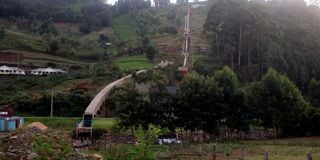Premium
KTDA factories sell idle land after switching from wood fuel

A section of the KTDA Gura hydro power project in Othaya in Nyeri county. The Sh1.3 billion 5.8-megawatt plant, launched in 2018, serves Chinga, Gitugi, Gathuthi and Iraini tea factories and sells surplus power to the national grid.
Factories affiliated with the Kenya Tea Development Agency (KTDA) are now selling hundreds of acres of land they had acquired to grow trees for firewood after they switched to own-generated electricity.
The tea factories have in recent months embarked on a land-selling spree to recoup cash from their idle assets to invest in other ventures.
On Friday, KTDA Management Services Limited issued a notice for the sale of 71 acres of land in Rwika, Embu, on behalf of Rukuriri Tea Factory.
"The property referred to as Rwika2 farm is 71 acres land formerly with tree plantation," said KTDA.
The company is also seeking to sell 106.47 acres in Mununga, Naivasha, on behalf of the Mataara Tea Factory and another 86.8 acres in Segera, Laikipia, belonging to Chinga Tea Factory.
This follows recent bids to sell 101 acres in Mururiri, Embu, belonging to Mununga Tea Factory and another 200 acres belonging to Ndima Tea Factory in Kihato, Laikipia.
Tea factories consume huge amounts of energy, which contribute to about 30 per cent of their operational costs and have for decades mostly relied on firewood fuel to power their operations.
But firewood proved expensive despite most tea factories owning their tree plantations, forcing many to invest in cheaper energy sources, especially hydroelectric power and solar energy.
In addition to meeting most if not all of their energy needs, tea factories are now selling excess power to Kenya Power which has increased their revenues.
KTDA set up the one-megawatt Imenti Tea Factory electricity plant, its first such project, in 2009 to power the factory's operations.
It then signed a power purchase agreement (PPA) with Kenya Power to sell the excess energy.
The plant earned Sh1.04 million in revenues from electricity sold to the power utility in the financial year to June 2022.
As KTDA set out to construct more power plants, it established KTDA Power Company Limited to manage its power generation venture.
The company earns five per cent of the total revenues earned from electricity sales by these KTDA-managed tea factories.
Another power station put up by KTDA-managed factories is the Gura Hydro Power Plant in Nyeri, which earned Sh178 million in revenues in the year to June 2022, an increase from Sh97.83 million in the previous year.
The 5.8 megawatts station supplies power to four factories namely Iriaini, Chinga, Gathuthi, and Gitugi.
Another is the 5.6 megawatts Metumi Hydro Power Plant in Murang'a, which supplies electricity to Kiru, Gatunguru, Kanyenya-ini and Githambo tea factories.
The power plant further earned the factories Sh105.8 million in the year to June 2022 from the sale of electricity to Kenya Power.
Apart from the global push for a cut in the use of dirty fuels such as firewood to reduce greenhouse emissions, tea factories are now unlocking fresh capital through the sale of their land assets to invest in more lucrative ventures, especially power generation.
Most of the existing KTDA-managed power plants were built using loans, with initial earnings from the power sales almost exclusively going to the repayment of these loans before tea farmers could start to get dividends from the electricity revenues.





